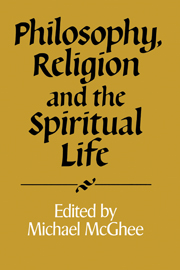Book contents
- Frontmatter
- Contents
- Introduction
- Philosophy and Religion in the Thought of Kierkegaard
- De Consolatione Philosophiae
- The real or the Real? Chardin or Rothko?
- Love and Attention
- Descartes' Debt to Augustine
- Visions of the Self in Late Medieval Christianity: Some Cross-Disciplinary Reflections
- Refined and Crass Supernaturalism
- Religious Imagination
- Moral Values as Religious Absolutes
- Revealing the Scapegoat Mechanism: Christianity after Girard
- Philosophy vs. Mysticism: an Islamic Controversy
- Non-Conceptuality, Critical Reasoning and Religious Experience: Some Tibetan Buddhist Discussions
- ‘Know Thyself’: What Kind of an Injunction?
- Facing Truths: Ethics and the Spiritual Life
- Notes on Contributors
- Index
Refined and Crass Supernaturalism
Published online by Cambridge University Press: 04 August 2010
- Frontmatter
- Contents
- Introduction
- Philosophy and Religion in the Thought of Kierkegaard
- De Consolatione Philosophiae
- The real or the Real? Chardin or Rothko?
- Love and Attention
- Descartes' Debt to Augustine
- Visions of the Self in Late Medieval Christianity: Some Cross-Disciplinary Reflections
- Refined and Crass Supernaturalism
- Religious Imagination
- Moral Values as Religious Absolutes
- Revealing the Scapegoat Mechanism: Christianity after Girard
- Philosophy vs. Mysticism: an Islamic Controversy
- Non-Conceptuality, Critical Reasoning and Religious Experience: Some Tibetan Buddhist Discussions
- ‘Know Thyself’: What Kind of an Injunction?
- Facing Truths: Ethics and the Spiritual Life
- Notes on Contributors
- Index
Summary
Introduction
In the postscript to The Varieties of Religious Experience William James distinguishes two types of belief in the supernatural, conceived as an essential component in religion, crass or piecemeal supernaturalism, on the one hand, and refined supernaturalism on the other.
For refined supernaturalism the supernatural only provides a totalistic explanation for the world as a whole and never explains any particular fact. This was the typical position of the dominant metaphysics of that time, namely the absolute idealism represented in Britain and America by such thinkers as T. H. Green, Bernard Bosanquet, F. H. Bradley and Josiah Royce, for which everything which is is an aspect of an all embracing eternal cosmic mind or spirit. For these thinkers particular facts are always susceptible of a quite naturalistic explanation at the phenomenal level. The state of mind of refined supernaturalists at that time is well conveyed by Mrs Humphrey Ward's novel. Robert Elsmere, which is certainly the best novel on a theological theme of which I know, and in which T. H. Green figures as Professor Grey. (Perhaps the second best is the same author's Helbert of Bannisdale.) For the refined supernaturalist special divine interventions, such as miracles, are mere superstition having nothing to do with real spirituality, except as symbols suitable for a more primitive stage of human culture than the present. What this comes to, as James sometimes sees it, is simply that the ordinary natural world of daily life is conceived with a kind of emotional glow upon it.
- Type
- Chapter
- Information
- Philosophy, Religion and the Spiritual Life , pp. 105 - 126Publisher: Cambridge University PressPrint publication year: 1992
- 1
- Cited by



